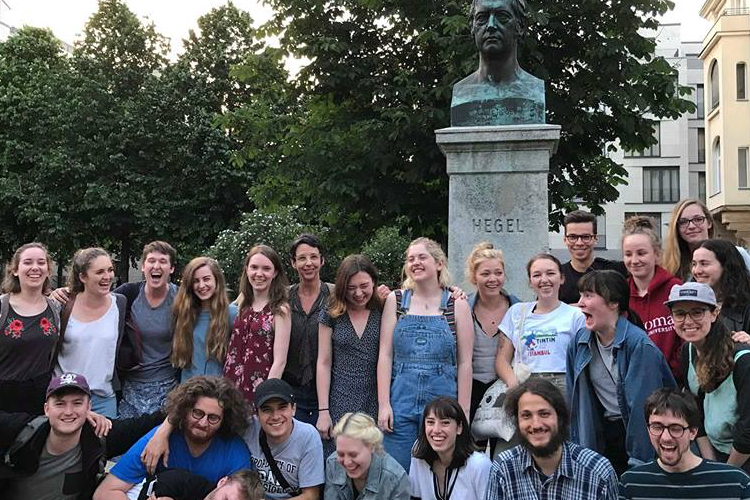Memory, Politics, Place - Berlin's 20th Century

The 2018 student participants for Memory, Politics, and Place
Institutional Association: University of King's College and Dalhousie University
Director: Prof. Sarah Clift
Program Website: https://ukings.ca/course/memory-politics-place-berlins-20th-century/
Program Description:The course, which runs for a month and is worth 6 credits, provides students with a unique opportunity to explore the themes of collective memory, public space, and historical trauma in Germany’s capital city. Through daily seminars, site-visits, flânerie, and museum tours, students gain an extensive knowledge of the ethical, aesthetic, and public struggle to take responsibility for history, in a city that is both freighted with the past and alive to the future.
How does this program benefit students?Throughout the duration of the course, students engage in close readings of various kinds of primary texts: works of political theory, psychoanalysis, architectural theory, sociology, and museology; memoirs; novels. They also engage with multiple kinds of memorial sites: monuments, museums, ruins, and memorials imbedded in the everyday life of Berlin. So, while developing their skills in critical thinking and conceptual analysis in daily seminars, they also learn the skills of site-specific analysis, including description, phenomenological attunement, and contextualization. These skills prepare them for further academic work in the upper years of their undergraduate degrees. They learn to draw connections between philosophical, psychoanalytical, and sociological concepts and memorial sites; they think critically and imaginatively about the relation between the present and the past; the relation between guilt and responsibility; the challenges of aesthetic memorialization in a post-genocidal context. They also learn how to write short reflective and critical papers, as well as a longer formal essay, with correct citations, and become adept at developing relations between critical thinking and the material and memorial culture of an urban landscape.
What were students looking forward to about the program?I ran the course for the first time in 2018 and was so excited for May 2020! May 2021 cannot come fast enough…The 2018 students really appreciated the resonance between the theoretical texts and our visits to specific sites. For example, they enjoyed reading about the relationship between political power and architecture—specifically fascist architecture—but that relationship really ‘came to life’ in experiential ways when we visited Berlin’s Olympiastadium, which was conceived and designed by Nazi architects.
They also enjoyed a month of living in a great and thought-provoking cosmopolitan city, and they definitely loved Berlin’s nightlife!
What's your favourite part of this program? I would have to say that my favourite part of the program is experiencing a city that I know so well through the ‘fresh eyes’ of my students. They make it new for me, and re-awaken my love for the city, in all its contradictions, its darkness and light, and its serious play. Relatedly, I really enjoyed our excursions too, which I found somewhat surprising. I’m quite a ‘book-ish’ type, and the thought of going around a big bustling city with 25 students was quite daunting. But those excursions always turn out to be wonderful experiences, and I got to know all the students really well as we made our way through difficult themes, museums, memorials, city parks, etc.
A lot of universities in Canada are promoting interdisciplinary learning. In what ways does your program support that goal?The course offers students the chance to understand how theoretical texts regarding politics, memory, identity, etc. impact the lived experience of architecture, city spaces, embodiment, and attention. They also become skilled in related abstract ideas—such as collective identity, historical trauma, and social responsibility—to more concrete issues, such as policy decisions, urban life, and accessibility. It also allows them to hear multiple perspectives (I had a number of guest lectures in the 2018 version of the course) on a common set of themes, and to exercise judgement and critical self-reflexivity regarding their reception of those perspectives. Perhaps most importantly (for non-German students), the course helps them think about how Germany’s memorial dilemmas can help us think about other historical and geo-political contexts where reconciliation efforts, reparations, and “working through the past” are part of the political landscape, and what they (as students of memory, as engaged citizens, as future policymakers) can do to advance those discussions in concrete ways.
Do you have any recommendations for other institutions looking to create a similar program? I would highly recommend forging partnerships with institutions/people in the city where you plan on situating your program, if at all possible (and no matter how informal). I found these partnerships invaluable in getting the program established, and I continue to find them very helpful in broadening or adapting the curriculum. Networks beget more networks, and that helps to keep the program current and responsive to new developments (in area-faculty, issues, possible collaborations).